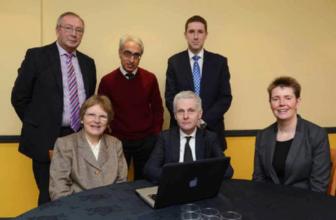IER News & blogs
Anne Green member of Wolverhampton Skills and Employment Commission

An independent Wolverhampton Skills and Employment Commission has been established to provide Wolverhampton City Council and its local partners with a set of practical recommendations on how to ensure that Wolverhampton has the appropriately skilled workforce required to support the City’s economic growth, to support the sustainability of businesses in the city and critically to ensure that residents and young people have access to the right skills provision to give them the best chance of securing employment. Anne Green, who was formerly Chair of the West Midlands Regional Observatory's Economy and Labour Force Topic Group and who has undertaken a series of research projects on local skills issues, has been invited to serve on the Commission and attended its first meeting at Molineux Stadium, the home of Wolverhampton Wanderers FC, on 6 January 2015. For more details see the Commission's website.
Reports from Talent Match National Evaluation
Researchers at IER are involved with colleagues at the Centre for Regional Economic and Social Research (CRESR) in the medium-term National Evaluation of the Talent Match Initiative. Talent Match is funded by the Big Lottery and is concerned with investing resources in a number of local areas in England where youth unemployment is a significant issue. The aims of the evaluation are to track the success of the initiative and projects within it - to identify what works well, for whom and in what circumstances; and to share learning and improve practice.
Duncan Adam, Gaby Atfield and Anne Green contributed to the first year Annual Report (click here for a Summary). Gaby Atfield contributed to a special report on the Involvement of Young People in the design and implementation of Talent Match, while Anne Green co-authored a theme report on Partnership Working.
Hold the Christmas cheer; it’s a patchwork jobs recovery
Professor Chris Warhurst is the Director of the Institute for Employment Research. He said: "The good news from today’s figures is that unemployment continues to fall and more people are in work. In fact Christmas present looks good. Almost half a million jobs have been created in the UK this year. The employment rate has risen to 73%, continuing an upward trend that started in 2011. Unemployment has fallen to 6%, this time the continuation of a downward trend. And the UK’s unemployment rate is far lower than the EU average (6% vs 10%). It seems like glad tidings for UK workers therefore. FInd out more at the Warwick newsroom.
Applications invited for two ESRC studentships to start October 2014
The Institute for Employment Research is offering two fully-funded PhD Studentships in association with the ESRC-funded project: Precarious pathways to employment for young people? Unpaid, temporary and involuntary part-time work in transitions from education to employment. The closing date for applications is Friday 5th September 2014.
IER July Newsletter now available
The latest news, publications and events from the Institute for Employment Research at the University of Warwick can be viewed in our monthly e-newsletter - July issue now available here.
